#make up by umberto
Text
I think as we grow up, we have to be really conscious of romanticizing the world we grew up in in order to scorn how the next generations are growing up.
Nostalgia isn't inherently bad, but especially in political spaces, be very wary of this idea that there is an Ideal Past we must Harken Back To.
It sucks to feel left behind, but such is the human condition. It isn't bad to feel nostalgic, but that doesn't mean that these new generations are inherently "lost" and "need to be saved (by you)", and I think that is very important to remember and try to be conscious of.
#politics#'the world you grew up in no longer exists' frankly... GOOD!#the world i personally grew up in was scary and lonely and traumatizing. no kid today should STILL be growing up like that#the whole 'nostalgia as a poltical means' is rooted in this idea that...#1) we all grew up in a hegemony 2) we all turned out the same 3) the way we grew up had more privileges afforded to us#and i personally like nostalgia! i like watching videocamera videos from 2005 and looking up super specific shit#but nostalgia does not a good world make#INSERT UMBERTO ECO'S FOURTEEN POINTS ON FASCISM#(though i don't always think nostalgia can lead to this in a political sense there is a fine line)#be very mindful of what motivates nostalgiaposting#is it because people miss childhood and how 'simple' it felt? or is there a different reason that motivates this type of posting?#are you romanticizing childhood to the point you are not remembering your childhood /at all/ but the *idea* of it?#and honestly it is SO jarring when my peers are nostalgic because it's like... we aren't even that old!!#it comes across like... the world is hard and it's getting harder and so we cannot chnage and must wistfully think of the past...#...and to me it comes across as almost... doomerist in how end-stage feelings of nostalgia and hopelessness seen#i feel compassion for the impulse to feel like your old life is over and you need to grieve it...#...but certainly that isn't the younger generations fault? especially because WE are now the ones rasing them and we still yet live#(even at our completely decrepit age of not even close to a mid-life crisis (sarcasm and lighthearted))
75 notes
·
View notes
Note
there's something extremely charming to "ugliness" to me. it's fun, i think. i like corny stuff. and so many things that are called "ugly" just have too much soul in them. having a thing made by someone who might not be too knowledgeable or doesn't have enough material to work with but still struggled through it, put their time and brain into it and presented to the world with goodwill often beats the most expensive and intricate pieces. maybe it's the animism instinct acting up but i think the things people make when they're still finding themselves are always the most delightful.
You are so right, especially about "doesn't have the best materials but makes the thing anyway" ugliness, or beginner's ugliness...! And I like your sentiment that "so many things that are called ugly just have too much soul in them". The old lady who sold me my house left a few of her handicrafts behind, and there's an unfathomable, ugly little creature she made that I'm very fond of. I'm keeping it always, I call him Eustache

I think Eustache's unique nose would be sublimated by appearing in the same post as this Umberto Eco quote so let me share it:
Beauty is, in some way, boring. Even if its concept changes through the ages, nevertheless a beautiful object must always follow certain rules. A beautiful nose shouldn’t be longer than that or shorter than that; on the contrary, an ugly nose can be as long as Pinocchio's, or as big as the trunk of an elephant. . . and so ugliness is unpredictable, and offers an infinite range of possibility. Beauty is finite, ugliness is infinite like God.

497 notes
·
View notes
Note
Since youre antifascist, how about you give us a definition of fascism? What exactly makes someone a fascist? (and in case you use terms such as left-wing or right-wing be sure to define them too)
Guess it's been a while since a clever Anon challenged us to define fascism, huh? Right, let's get into it:
Via the United States Holocaust Memorial Museum:
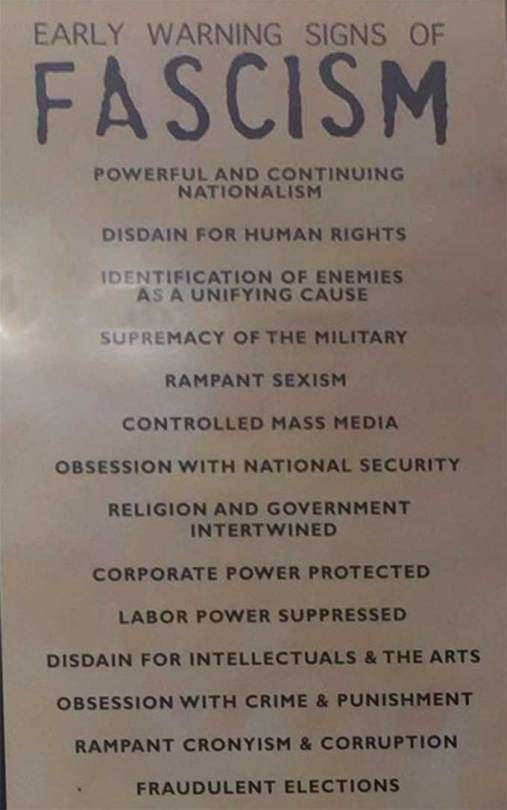
Yale professor Jason Stanley:
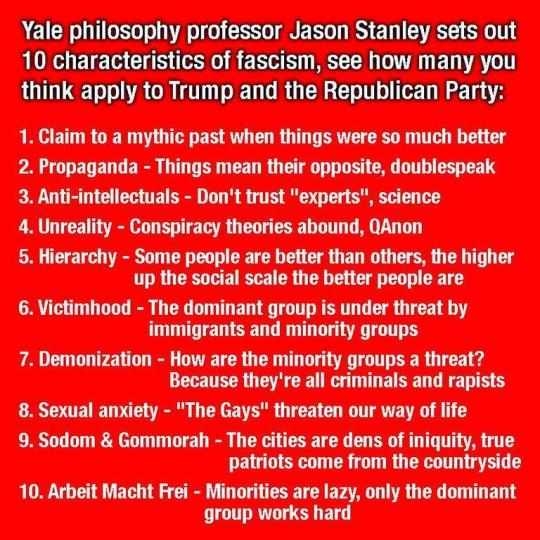
“Fascism is a creation of race hatred and its politically organized expression.” - Willhelm Reich, The Mass Psychology of Fascism (1933).
“Fascism is capitalism plus murder.” - Upton Sinclair
“Repression by brute force is always a confession of the inability to make use of the better weapons of the intellect — better because they alone give promise of final success. This is the fundamental error from which Fascism suffers and which will ultimately cause its downfall…that its foreign policy, based as it is on the avowed principle of force in international relations, cannot fail to give rise to an endless series of wars that must destroy all of modern civilization requires no further discussion. To maintain and further raise our present level of economic development, peace among nations must be assured. But they cannot live together in peace if the basic tenet of the ideology by which they are governed is the belief that one’s own nation can secure its place in the community of nations by force alone. ” - Ludwig von Mises, Liberalism: A Socio-Economic Exposition (1927).
“Spent most of the day reading fascisti leaflets. They certainly have turned the whole country into an army. From cradle to grave one is cast in the mould of fascismo and there can be no escape … It is certainly a socialist experiment in that it destroys individuality. It destroys liberty.” - Harold Nicolson, The Harold Nicolson Diaries : 1919-1964 (2004).
“The liberty of a democracy is not safe if the people tolerated the growth of private power to a point where it becomes stronger than the democratic state itself. That in its essence is fascism: ownership of government by an individual, by a group, or any controlling private power.” - Franklin D. Roosevelt
“A fascist is one whose lust for money or power is combined with such an intensity of intolerance toward those of other races, parties, classes, religions, cultures, regions or nations as to make him ruthless in his use of deceit or violence to attain his ends….If we define an American fascist as one who in case of conflict puts money and power ahead of human beings, then there are undoubtedly several million fascists in the United States.” - Henry A. Wallace
“Fascism is the cult of organised murder, invented by the arch-enemies of society. It tends to destroy civilization and revert man to his most barbarous state. Mussolini and Hitler might well be called the devils of an age, for they are playing hell with civilization.” - Marcus Garvey, Authors take Sides on the Spanish War, 1937
Philosophy Tube's breakdown of the elements of fascism is very thorough and recommended if you're not the reading type.
But do you read books? We hope so if you're looking to engage in political discussion about anything. Here are some books that tackle the definition of fascism, in whole or in part, that we would recommend to you (check/order from your local library!)
Mark Bray's highly-accessible Antifa: The Anti-Fascist Handbook is a great starting point for this topic.
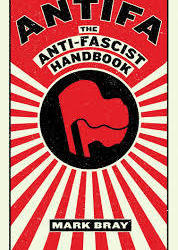
Columbia history professor Robert O. Paxton's excellent book The Anatomy of Fascism goes into this in great detail.
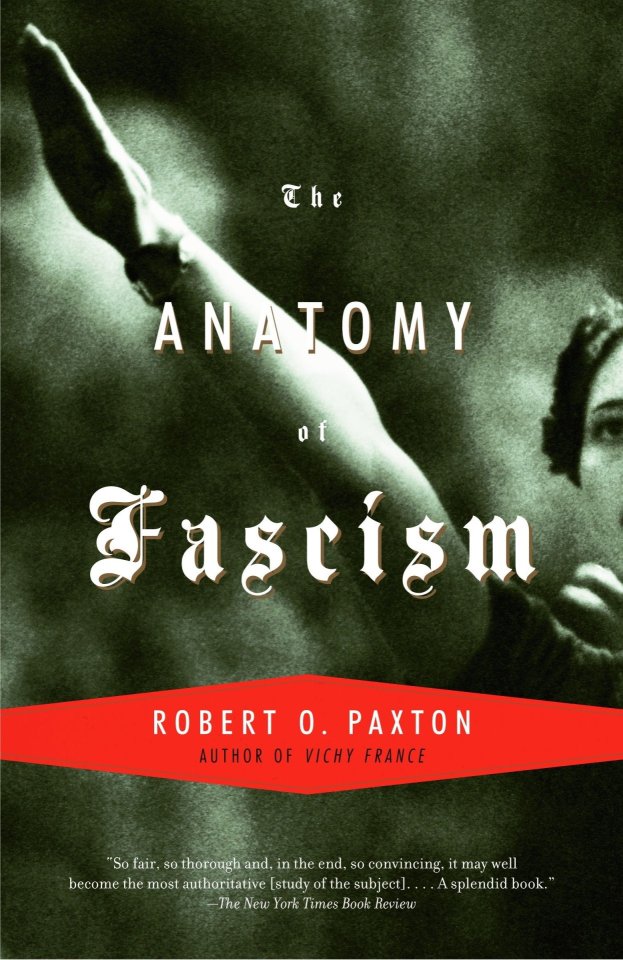
There's also Umberto Eco's The Eternal Fascist
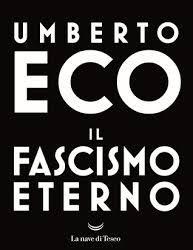
or his "practical list for identifying fascists"
as well as Hannah Arendt's seminal The Origins of Totalitarianism
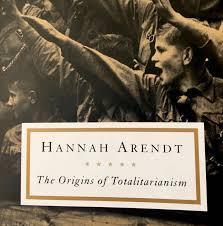
We hope you weren't looking for a simple answer to the complex question of "what is fascism?" Anon, just as we hope you're up to taking our challenge of checking out all of the above so you're curiosity is satisfied and you're well-versed on the topic.
648 notes
·
View notes
Note
I don’t agree with everything said here but: [link removed]
For context, someone sent me a link to a post about elements of fascism and copaganda they feel are present in MHA. I've removed the link for anonymity purposes.
I have no interest in responding to this essay point-by-point. As a brief, BRIEF, BRIEF summary, the linked post makes claims such as:
MHA is pro-authoritarian
MHA is pro-cop
MHA doesn't have these elements promoting fascism on purpose but the elements are there regardless
MHA's ending endorses philosophies it previously criticized
MHA readers who don't pick up on these things lack critical thinking
MHA's hero system is comparable to the fascistic element described in Umberto Eco's "Ur-Fascism" that "everybody is educated to become a hero"
Nothing in MHA's hero society changes
They say a lot of stuff I really don't see as relevant at all, a lot of nonspecific platitudes and philosophical nothings. They frame the story in MHA as if it says a lot of stuff or does a lot of things that I personally don't see or agree that it does. It also goes on to talk about elements in the story it fails to explore like themes of child soldiers and punishment before crime.
I appreciate that the post acknowledges they see these elements in MHA as unintentional. That makes it easier for me to consider their POV and understand where they're coming from.
That said, my response can only be: it's not that deep.
If I want to, I can read elements of ANYTHING into any story. It's very easy to do. There are whole arms of literature study basically dedicated to reading certain philosophical angles into stories that they know are not intended elements in said stories. But there needs to be some self-awareness here before we take anything that far. Equating heroism in MHA to Humberto Eco's concept of a cult of heroism that equals a cult of death is just another version of the same take I've debunked before. I don't agree with the essay's interpretation of this theme at all. My impression is THEY had a certain reading on MHA in its earlier arcs that conflicts with later arcs, but I have a reading that reads the arcs as harmonious. We are at too many odds here.
But because I acknowledge that the major difference between me and this essayist is that we have VERY different readings of MHA in the first place, I don't really wanna take the time to answer all of their points. They all clearly come from a logical place based on their own interpretation, and I don't see anything wrong with that. If that's their reading, they are welcome to it. It's a little obnoxious to claim the rest of us lack critical thinking just because we don't point out these elements they see as fascistic. To me, the stuff they identify that fuels their branching criticisms is stuff hopefully everyone has to acknowledge before they even start reading the shounen genre. I have to suspend my disbelief in the first place when I'm reading about superheroes as a social system. I have to suspend my disbelief in a shounen action manga where the fate of the world is at stake. These are things we all have to understand going in. Not every story aimed at young teenage boys is going to have the space to explore the nuance in all these social systems. It's just not that deep.
So is MHA copaganda? Setting aside the dissonance of comparing western forms of copaganda to Japanese shounen manga forms, sure, fine--so far as the story depicts an organization, particularly one with law enforcement powers, as not wholly incompetent or corrupt goes. But like, the story itself does pose the question of whether the existence of this organization (the heroes) is necessary, which is posing the fundamental question of anti-copaganda at the narrative too. The question is, what answer to this question do we get from the ending? You can read the ending as, "Everyone needs to be heroes (cops)," or you can read it as, "Everyone needs to be good to each other and then the hero system becomes unnecessary," but no matter what, the ending still says, "The hero institution as it is is not the answer." This is what I mean about gradualism and collectivism easily being co-opted by fascism or by socialism. MHA does basically say, "The current system sucks, so we have to change it," and then changes it. It's just not a satisfying change for anyone who wanted a radical revolution. Gradualism is a position that has MANY critics for this exact reason.
But even on the topic of gradualism, I think it would be a mistake to say that MHA teaches us, "Only incremental change is possible." The way I read its themes are that it's saying "Trying is important; even when all you can achieve turns out to be incremental, it's still worth trying."
As for the themes of collectivism in MHA, collectivism can easily read like paternalism to a western (white) audience, which is a whole other issue. This is why there's so much debate about whether or not people are coming from a place of good faith when their criticisms don't seem to acknowledge the eastern philosophies at play in MHA. In truth, I would be hard-pressed to name an anime that doesn't have an ending that feels weird to me. Every single anime ending I know has an element I find confusing or disquieting or off, and my conclusion has been to acknowledge that anime isn't made with me in mind as its audience. Oftentimes, stuff happens in anime that just doesn't jive with my upbringing, but I recognize it is coming from a different worldview that my upbringing has often caricatured as evil and oppressive and wrong without any nuance. It highlights for me how the media from my general worldview must also look ridiculous at times to others not in the know. So while I think it's perfectly acceptable to point out elements that do seem fascistic in any media and to stay vigilant about them, I do also take care to be open-minded about learning what other things may be going into these stories that could provide a completely different perspective.
As @siflshonen would say, sometimes all I can do is say, "I'm too western for this," and move on.
77 notes
·
View notes
Text
Beyond the Word Count: A Book Editor's Guide to Writing a First Draft

Every year, we’re lucky to have great sponsors for our nonprofit events. First Draft Pro, a 2023 NaNoWriMo sponsor, is a beautifully designed writing app for fiction writers. Today, they've partnered with Kelly Norwood-Young, former book editor for Pan Macmillan and Penguin Random House, to bring you some pro tips on writing your first draft:
In my career as a book editor, I’ve reviewed hundreds of manuscripts. I've seen the joy of authors creating compelling tales, but also how disheartening it can be to rewrite a disjointed story. I’m here to give you some strategies to address common pitfalls so that you not only reach your NaNoWriMo goal, but also lay the groundwork for a manuscript that truly deserves to be called a gripping novel.
1. Have a plan.
Even if you’re more of a ‘pantser’ than a ‘planner’, it's really helpful to have an outline. I have two favourite approaches for this: the structure-first approach, and what I call the ‘Phoebe Waller-Bridge approach’.
The structure-first approach
There are a lot of narrative frameworks for story structure, but the most foundational in Western fiction is the three-act structure. Here’s a handy guide that breaks each of the classical three acts into a day-by-day guide to NaNoWriMo:
8-day guide to Act 1
14-day guide to Act 2
8-day guide to Act 3
The Phoebe Waller-Bridge approach
I love this quote from Phoebe Waller-Bridge: ‘I’ve never thought structure first. I’ve always thought material first, jokes first, character first ... But knowing the end really helps. Then you just go as far away from the end emotionally as you possibly can.’
Sketch out your major story arcs, your character’s desires and conflicts, and the world they inhabit. The more you know your story's world and inhabitants, the less you'll stray into scenes that lack purpose or create plot and character inconsistencies.
2. Keep the story moving.
Each word needs to propel your story forward. Superfluous details or tangents that don’t serve the narrative stall the momentum you’re trying to generate for your reader.
There’s a trick you can use to move your story forward, called the question of reversibility. Ask yourself: How difficult would it be for my character to reverse their decision? The harder it would be for them to turn back, the more you’ve moved the plot forward.
3. Plant clues carefully.
Plant important elements early and make sure every element, however subtle, serves a purpose (i.e. Chekhov’s Gun).
Be sure to set up necessary components for your climax so that you can steer clear of Deus ex Machina (having that strong outline will help you here), and avoid red herrings unless they serve a clear, meaningful purpose (e.g. you’re writing a mystery and your readers expect some false leads). Misleading your readers without a payoff can erode their trust.
4. Write for the reader, not yourself.
‘There is only one thing you write for yourself, and that is a shopping list,’ insists Umberto Eco in On Literature. Even if writing, for you, is a therapeutic outlet, a form of self-expression, or a way to leave a legacy, you’re still writing to say something to someone else. Your story simply won’t be as strong if you forget your reader’s perspective.
5. Keep daily editorial notes for your future self.
While editing should wait until at least December, end each day with a brief reflection, noting any off-course deviations, potential inconsistencies, areas to research further, or moments of inspiration to revisit when you start editing.
These daily notes will be invaluable during the editing process, helping you to remember insights that are no longer fresh when you come back to the manuscript later.
6. Embrace the first-draft mentality.
There’s a lot you can do to ensure that your first draft is the best it can be before the end of November—but just as important is to understand that all first drafts have flaws.
As a book editor, I've witnessed manuscripts transform, sometimes unrecognizably, from their first drafts. Embrace the uncertainty and creative detours—because it's from this beautiful chaos that your story will find its true voice.
Kelly Norwood-Young is a seasoned book editor and proofreader with comprehensive experience across various facets of manuscript editing. Her background includes roles at Pan Macmillan and Penguin Books, extending into a successful freelance career working with award-winning authors. Kelly's work, known for its precision and sensitivity to the author's voice, has been integral to the success of both new and established writers globally.
Try out First Draft Pro: All NaNoWriMo participants can use the discount code NANOWRIMO2023 for 20% off a premium subscription to First Draft Pro! Offer expires January 31, 2024.
#nanowrimo#writing#first draft#writing advice#by nano sponsor#first draft pro#kelly norwood-young#plot#planning
357 notes
·
View notes
Text
I'm rereading Feet of Clay, and something I love about Pratchett's writing is that you keep discovering new things with every reread. This man is a fucking genius; and I say is because we all know a man is not dead while his name is still spoken, and I am very much speaking his name, very loudly and with an undertone of exasperated delight.
(MASSIVE spoilers for Feet of Clay, obviously; do not click if you haven't read that book)
Okay, so the poison was in the candles, right? We all know that, and when you reread the book with that knowledge, you notice all the clues that Vimes will later put together. "Une mèche en métal gris" (a wick of grey metal) in the candlemaker's coat of arms. "Art brought forth the candle". Vetinari doing a whole infodump about arsenic and to "put it where no one will look" (the bastard already knew). The emphasis on the candle being the last sentence in the scene where Vetinari's writing, right before his condition gets worse.
A good writer knows how to sprinkle foreshadowing in ways that are just obvious enough to pick up after the fact.
But you know what a great writer does?
Spread false leads.
I honestly don't remember what I deduced the first time I read the book; I was in high-school and tearing through it without stopping to really think about the clues, and also I had little to no knowledge of the cultural stories around arsenic. But on reread, I keep noticing remarks about the wallpapers.
And if you know anything about the Victorian era, the combination of arsenic and wallpapers will immediately make you go "Pass me a towel!!".
THAT BASTARD (affectionate) PTERRY WANTED US TO THINK IT WAS THE WALLPAPER!
And it's not just once, no. There's Vimes' remark about "That seemed to be about it, short of stripping the wallpaper off the wall", which make me chuckle and mutter "oh come on!". But then later on there's "You might as well accuse the wallpaper of driving him mad"... with the added detail that THE WALLPAPER IS GREEN. IT'S FUCKING GREEN. Pterry KNEW what he was doing.
It takes a third mention of the wallpaper (the fact that it's the same in all rooms and Vetinari's condition hasn't been getting better) before Vimes actually consider it; but we the reader would have been yelling "It's the wallpaper!! It's the wallpaper!!" since the first mention of green.
And this is exactly what you expect from a good writer, right? Give you enough clues to figure out the mystery yourself and feel smart.
And if you didn't notice the wallpaper, or dismissed it in the same way Vimes eventually does (it's been there for years and Vetinari has only just started getting sick), then there's the ink on the journal.
(Spoiler for "The name of the rose" by Umberto Eco)
If you've read the book or watched the movie "The name of the rose", the second Vetinari is described licking his fingers to turn the pages of his journal, you should have been screaming "THERE'S ARSENIC IN THE INK!!!" (or at least giving very heavy suspicious side-eyes at the journal and at Pterry).
This is Terry Pratchett's genius, to me, in this book. Sprinkling false leads that seem like solutions to the reader because of our culture, of our knowledge of history or other works of literature, to make us feel smart for having figured out the mystery from the contextual clues before the characters do, and enjoy the fun frustration of watching them bumble around and miss details that we picked up on because we have context that they lack...
And then turn around and pat us on the head and say "Well done, but I played you, you picked up exactly the clues I wanted you to, and ignored the real ones", and you can't be mad at him because the real clues were there! In plain sight!!! The goddamn coat of arms were presented literally within the first twenty pages! We get to feel smart for about half the book, before we realize we've been played, just like Vlmes.
I fucking love Terry Pratchett so much.
67 notes
·
View notes
Text
The thing about debating whether or not Kanye really means what he's saying or if he's having a mental breakdown is that the distinction isn't really that important. I'm being so serious when I tell you that Fascism is about self-destruction. Fascism is about rage at the world and yourself for not being strong, not being in charge, not being the big man, not being an Adonis ruler hustler boss king. It's about jealousy and impotence and projecting your desire to die out on to the world that isn't rewarding your ego.
None of their beliefs make sense or can withstand the slightest bit of investigation because it doesn't fucking matter. Look at someone like Alex Jones, that slow-motion divorce of a man. Everything he does is in this prolonged death spiral. Nothing he says make sense of holds up under scrutiny. He doesn't think his actions through and there's no clear pattern to what he actually wants. But he makes it work because it appeals to people who feel the same, who's only real motivation is to lash out at the world for not rewarding their king complex.
THIS IS NOT SUBSTANTIALLY DIFFERENT THAN WHAT HAPPENS WHEN A RICH MAN IS CHALLENGED, WHEN THE WORLD FINALLY TELLS HIM NO. Elon Musk is the same as Kanye is the same as Richard Spencer is the same as fucking Mussolini; they can't handle not being the king, they can't handle being challenged, they can't handle being contradicted. They want an impossible fantasy where they take and never give, where the whole world lines up to suck their cock clean. THIS IS THE ROOT OF OUR CLASS SYSTEM, THIS IS CAPITALISM COME HOME. It's not going to fucking end until property, state violence, and class end.
Fascism is when you're all cut up about not being a winner and decide to double down and punish the world for it. It's pathetic and nonsensical and halfway between a suicide and a cry for help. Except, when our society is based around rewarding this kind of puerile clinging to privilege, they get into the executive branch and decide that thousands of people have to die because of it! Because our nation states and corporations are not that far removed from this impulse!
What was that Umberto Eco quote again?
" By contrast, the Ur-Fascist hero craves heroic death, advertised as the best reward for a heroic life. The Ur-Fascist hero is impatient to die. In his impatience, he more frequently sends other people to death." -Umberto Eco, Ur-Fascism
802 notes
·
View notes
Text
A Different Man dives into an absurdist exploration of identity
Sebastian Stan and Adam Pearson are unforgettable as friends and rivals in a beautifully bizarre take on what it means to be human.
By: Sarah Gorr
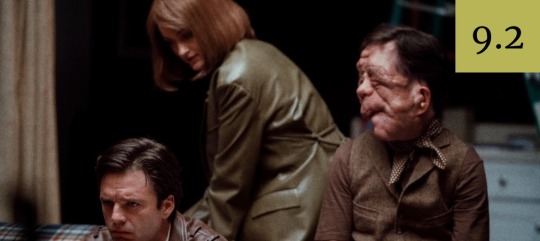
A Different Man dives into an absurdist exploration of identity
A Different Man is all about what it means to be seen, in all the best and worst ways. It’s what it means to avoid eye contact with the unhoused man on the subway and to gawk at anyone who looks remotely outside the norm. It’s the difference between simply being noticed and being intimately seen, the way only someone who actually understands you can.
Writer and director Aaron Schimberg looks for as many ways as possible to play with these ideas, fitting the seer and seen inside each other in a little matryoshka doll. But first and foremost, our gaze is on Edward.

Adam Pearson isn’t internationally known, but he’s known to rock a microphone. (Matt Infante/A24)
Edward (Sebastian Stan) is a struggling actor with a rare condition that covers his face with large, benign tumors. He’s quiet and reserved. His every movement reveals a discomfort even existing in the world, never mind taking part in it. So when he gets the chance to take an experimental new drug that can completely heal him, he does so without a thought. Reborn as his new, more handsome self, he finally gets what should be the part of a lifetime in a local play based on his life. That is until Oswald, a man with the same condition as Edward, steals the part. In the process, this new arrival reveals just how exactly Edward has actually transformed.
Sebastian Stan captures all the nuance and complexity of Edward as he stumbles through this journey in a manner that’s nothing short of impressive. Hidden behind Mike Marino’s brilliant prosthetics, Stab carries the weight of his performance in body language. The slump of his shoulders, the way his eyes apologetically flit to those around him as if apologizing for even existing. Post-procedure, Stan infuses the performance with Edward’s confusion, frustration, and even unbridled rage. Schimberg’s script is an actor’s dream, and Stan more than lives up to the part.
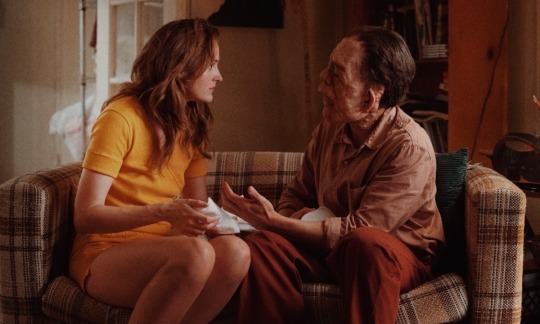
Renate Reinsve isn’t buying what Sebastian Stan is selling vis a vis a plaid couch. (Matt Infante/A24)
Meanwhile, Adam Pearson’s performance as Edward’s foil, Oswald, was clearly crafted with the actor in mind. It’s an incredible showcase for Pearson’s exuberance and energy. He steal every scene he’s in and gives Edward’s jealousy the perfect excuse to boil over. He embodies everything Edward is not: charming, confident, witty. Pearson’s Oswald is a man you not only want to know but are downright grateful to have in your life.
Together, Pearson and Stan depict a dynamic that is mesmerizing to watch. Does any of Schimberg’s script work half as well without them? Honestly, it’s impossible to imagine.
However, audiences shouldn’t take that as a slight against Schimberg. His script is an intensely rich text, less Beauty and the Beast, more The Scorpion and the Turtle. A Different Man questions not just what’s in a person’s nature but what benefits or inhibits the performance of identity. In art, what makes something feel real or true? What truths benefit a piece? Which hinder? What facets of ourselves we take as inherent truths are anything but?
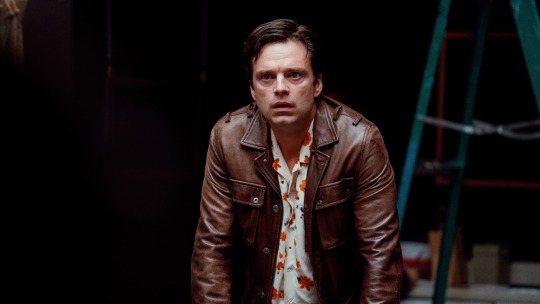
Sebastian Stan is giving what if autumn was fashion.(Matt Infante/A24)
It’s a film in a constant push/pull with transformation vs. consistency. Permeating it all is a sense of bleakness that seems to radiate from Edward himself. It infects everything from Umberto Smerilli’s bold and moody score to the film’s very texture, with its high contrast, sharp shadows, and rich color. It all comes together as if to say Edward’s insecurities, anxieties, and sadness that can’t seem to disappear as quickly as his features transformed.
Schimberg’s depiction of Edward’s journey to something like a discovery of self is part tragic, fully comic, and delightfully absurd. It’s a distinct film, despite the comparisons to Coralie Fargeat’s The Substance that people are already forming, and more than worth the price of admission.
A Different Man gives face in limited theatres starting September 20 before opening wide on October 4.
28 notes
·
View notes
Quote
That last word—simulate—is key. The technologies that have advanced since the seventies are mainly either medical technologies or information technologies—largely, technologies of simulation. They are technologies of what Jean Baudrillard and Umberto Eco called the “hyper-real,” the ability to make imitations that are more realistic than originals. The postmodern sensibility, the feeling that we had somehow broken into an unprecedented new historical period in which we understood that there is nothing new; that grand historical narratives of progress and liberation were meaningless; that everything now was simulation, ironic repetition, fragmentation, and pastiche—all this makes sense in a technological environment in which the only breakthroughs were those that made it easier to create, transfer, and rearrange virtual projections of things that either already existed, or, we came to realize, never would. Surely, if we were vacationing in geodesic domes on Mars or toting about pocket-size nuclear fusion plants or telekinetic mind- reading devices no one would ever have been talking like this. The postmodern moment was a desperate way to take what could otherwise only be felt as a bitter disappointment and to dress it up as something epochal, exciting, and new.
Of Flying Cars and the Declining Rate of Profit
53 notes
·
View notes
Text
We all know that Steve isn't big on reading, possibly because of all the head trauma. Eddie is the opposite, he basically lives in books. Sometimes he reads to Steve before sleep, or when Steve cooks, bakes, anything that requires his focus. Even when audiobooks become a thing, he says he can't fully focus on a book unless it's in Eddie's voice. That might be a lie, but Eddie never tries to disprove it.
What Eddie does, however, is note down interesting quotes from the books he reads. He scribbles them onto sticky notes in his messy handwriting and then leaves them for Steve to find - in his pockets, on the fridge, in Steve's favorite coffee mug.
Sometimes they are short. Sometimes they take up several sticky notes. But there is always an addition from Eddie, something to make it personal.
"What is love? There is nothing in the world, neither man nor Devil nor any thing, that I hold as suspect as love, for it penetrates the soul more than any other thing. Nothing exists that so fills and binds the heart as love does. Therefore, unless you have those weapons that subdue it, the soul plunges through love into an immense abyss." - The Name of the Rose, Umberto Eco. Made me think of you.
"He's more myself than I am. Whatever our souls are made of, his and mine are the same." - Wuthering Heights, Emily Brontë. Shows that music taste doesn't reside in the soul, don't you think, big boy?
“I would rather share one lifetime with you than face all the ages of this world alone.” – The Fellowship of the Ring, J. R. R. Tolkien. I've read this so many times, but I only get it now, Stevie. You made it make sense.
Of course, there are funny ones too, inspirational ones, but the ones about the two of them are Steve's favorite. He keeps all the sticky notes organized in a binder, with dates and maybe even snippets of the books when he attempts to read them. He rarely finishes any of them, but Eddie finds himself not caring about it anymore. The moments reading for Steve are sacred and he often throws the party out of the kitchen when Steve bakes. Well, sometimes with the exception of Will and El, those two are always welcome to their quality book time.
As Steve bakes snacks for the latest Hellfire campaign and Eddie's voice carries him to a different world full of adventure, knights and doomed romances, Steve stops him from time to time. "Um, could you- oh fuck, wait a second, I don't want this to burn..."
And before he finishes saving the pastries, there is a sticky note ready for him, with a small note: for my cute pastry savior.
Steve wonders how many binders he'll manage to fill during their life together. He can't wait to find out.
#stranger things#strangerthings#steve harrington#eddie munson#steddie#steddie drabble#steddiedrabble#steddie hc#strangerthingsdrabble#stranger things drabble#steddie ficlet
593 notes
·
View notes
Text
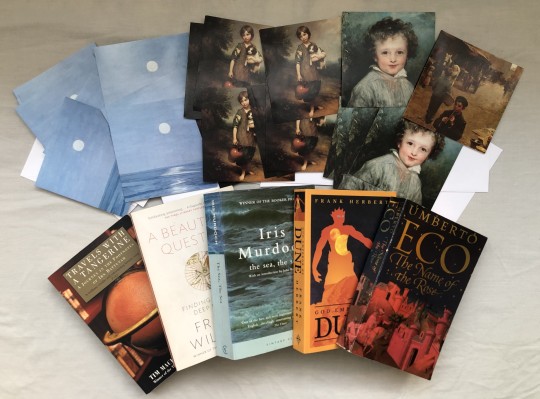





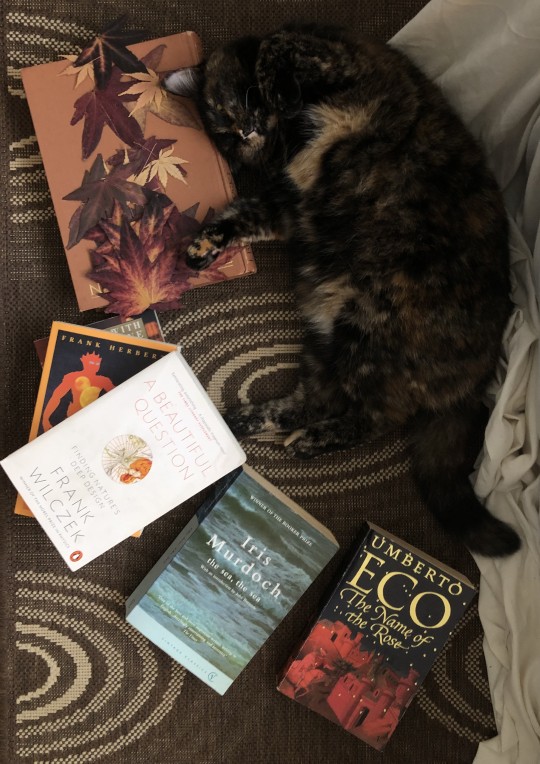
thrifted bookish finds 13/jan/24
Went back for the rest of those beautiful cards. I discovered that the art printed on them is of the art displayed in The National Art Gallery of Ireland. Here are the names of the pieces with their artists:
The Cottage Girl — 1785 — Thomas Gainsborough.
Smiling Girl — c 1840 — Richard Rothwell.
Moonlight — 1976 — Paul Henry.
Near St. Patrick's Close, an Old Dublin Street — 1887 — Walter Fredrick Osborne.
Here are the books I found today:
The Sea, The Sea by Irish Murdoch �� modern classic, Irish literature, philosophical.
The Name of the Rose by Umberto Eco — crime/mystery, Italian literature, historical fiction.
Travel with a Tangerine; a Journey in the Footprints of Ibn Battutah by Tim Mackintosh-Smith — travel writing memoir, Middle Eastern & North African literature, biography.
A Beautiful Question; Finding Nature's Deep Design by Frank Wilczek — non fiction, scientific, philosophical, historical.
God Emperor of Dune (book 3) by Frank Herbert — science fiction, fantasy, philosophical, classic.
The flowers around my books are ones I've collected around the neighbourhood and our back garden and pressed between my chemistry, math, microbiology and pharmaceutics textbooks. I've been doing this for about two or three years now. I've always admired and desired these 'girlish' or old-fashioned hobbies and one day I realised that I could just do them, I didn't have to keep watching from a distance, at pictures and moodboards. And I did. I started, making my own bookmarks, learning embroidery, learned to hemm and fix up clothes, pressing flowers, owning plants, drying flowers and herbs, and practising henna designs.
Everyone, say thank you to my cat who flopped beside me while I was having the loot photoshoot. I had to move fast to get the books around her before she moved away. You know how fickle cats are.
#nejj bookblr#books#bookworm#bookish#book blog#book photography#bookblr#booklr#reading#classic academia#romantic academia#literature#english literature#fiction#cozycore#photography#light academia#softcore#aesthetic#art
36 notes
·
View notes
Note
I really love thinking about the nicknames that drivers are given.
For the Ferraris there’s il predestinato/maranello’s sun and smooth operator/chili.
Like one has the weight of a nation on his shoulders, predestined to be glorious and bring back the championship to Maranello. He is the golden boy who’s grown in front of their eyes.
The other sang a song during a race and he’s spicy???
Then with the mercs you have billion dollar man and Mr. Saturday.
Lewis Hamilton is just that guy, he’s known by all and all that. He’s got the records/wins/championships/investments/money. And George does really good on Saturdays.
With hulkenberg it’s just hulk because it’s in his name.
The Red Bulls you have super max and the Mexican minister of defense. Which are both great nicknames to have, but then you look at Checo’s 2023 season and you have to question it. Max also had mad max for his ability to terrorize all the older drivers with moves they thought were insane.
Daniel’s got the honey badger and he’s made it his. He looks all nice and non threatening with all his smiles and jokes, but give him a good car this man will make your life miserable. (Nico Rosberg talking about how when he was with Merc and they were pitting none of them wanted to come out near Daniel because he’d either overtake you or not let you overtake him)
It’s so funny to compare the nicknames between teammates. Because one is usually something legendary and the other has a silly little fun nickname.
Personally I think Mr. Saturday should be revoked. He is Mr. Friday lately he doesn’t turn up on the weekends. Also, it’s a very smug sounding nickname which I guess suits George but it just annoys me. Also this is SO random but Mr. Saturday reminds me of “Mr. Exclusive” from Bruce Almighty for no reason.
The discrepancy between the Ferrari nicknames is staggeringggggg and I think it says it all really 😂 Il Predestinato sounds like something out of a book co-authored by Umberto Eco and Tolkien and Carlos’s friends drunkenly called him Charlie then Chilli and now it’s a thing…dead
I’ve got attached to the honey badger thing because Daniel wears it with such flair but ngl I hate it logically.
Checo…parliament is voting on a new minister after Brazil that’s all I’ll say on dat.
Mad Max was a very sexy nickname but I feel like it was kind of mean considering how many people still hold that aggression against him. Super Max for me always reminds me of that scene in DTS season 2 where Max wins at red bull ring with the Honda guy there and he’s crying when Max wins standing with Christian and he goes “super max” is a Japanese accent. It’s just the cutest thing! I sort of feel like Max deserves a more epic nickname but at the same time it’s sort of poetic that he has pretty standard ones despite all he’s achieved, because even if he’s the best there ever was he’s still so normal. Idk there’s synergy there.
40 notes
·
View notes
Text

...N O W L O A D I N G....📼
Money Inc. x GTA: Vice City AU headcanons- IRS
Codename/Alias: The Kangal. The Kangal is a breed of dog renowned for its protectiveness and shepherding qualities, but must importantly, the Kangal is feared for having the strongest bite force. Ted lovingly gives Irwin this nickname. Initially hesitant in being likened to a guard dog, Irwin starts to warm up to it...
Irwin, by day, works as an accountant in Downtown Vice City's business sector (mainland). At night, he works as a hitman/bounty hunter, accepting jobs from clients on both the Mainland and Beach/Nightlife area. Most of his clients come from the more affluent sections of the city. Once he starts working with Ted exclusively, he stops all contract work but still keeps his job as an accountant.
Famed (or infamous, depending on who you ask) for having an amazing work ethic in both jobs.
His last contracted bounty job didn't go as planned.... (x) (x)
Used to have a mullet; cuts it off once he joins Ted.
His original kit included the following: Col .45 (handgun), Ithaca 37/Chromed Shotgun, and his trusty Remington Model 700 (sniper rifle).
Ted gifts him with more weaponry, specifically a submachine gun (MP5), and an AR (the M4)-- for those tougher jobs.
Favorite radio stations: Emotion 98.3, VROCK, and VCPR. He enjoys listening to talk radio on the way to work.
Favorite vehicles: PCJ-600 and the Sentinel XS
His apartment is located in Vice Point (away from the mainland/downtown area). Although his apartment is a mere minutes away from the prolific Malibu Club, he prefers quiet nights at home watching Yuppie and the Alien or Just the Five of Us.
Doesn't smoke during the day, only when he's on the job--especially if there's a lot of waiting. It calms him down, allegedly.
After work, you can catch Irwin at Umberto Robina's cafe in Little Havana enjoying a coffee. Considers Umberto a friend and likewise Umberto considers Irwin a real man with "big cojones."
"Balances" the books for Ted's other money laundering businesses.
He also balances Ted's boisterous personality-- Irwin is very cool, calm, and collected. The poster child for the strong, silent type.
Has been known to crack a smile at times-- Ted can vouch for it.
During a meet up, Irwin acts as Ted's back-up if things go south. He is often seen carrying a briefcase- filled with either money or "goods."
If Ted insists on going to a meet-up alone, that doesn't necessarily mean that Irwin isn't there. You may not be able to see him, but he can see you....
Is a superior marksman. One shot to kill if necessary, never maim- he makes sure all of his shots are clean. If someone gives Ted a hard time, Irwin gives them a corpse worthy of a closed casket funeral.
Often refuses Ted's other lavish gifts like expensive suits, cologne, watches, etc. Will take the gifts after much insistence, but will be shy to use or wear them. Plus, Irwin feels like if he does wear any of Ted's gifts at his day job, he'd stick out like a sore thumb. What's an accountant doing with a $75,000 Rolex, anyway?
#irwin r schyster#money inc#money inc x vice city au#irs#lux.doc#my art#GOD- guys....i'm really deep in it lol#takes me a lil longer to replicate but i've always loved the style of the 3D era gta games#money inc logo was a pain in the ass to recreate but at least now i have it#...ted is next 👁️👁️
13 notes
·
View notes
Note
Quick question: From 1 to 10, how do rate Darren's Italino or his Italian accent? Is he offending or good?
Omg I love this questiooon
I'll start by saying that I love hearing Darren speak Italian. It's funny how his voice is normally very "powerful" and, shall we say, manly, whereas when he speaks Italian he becomes another person, a lovely little flower. Personally, when I am sad I like to watch old videos of him doing that. It simply puts me in a good mood.
Technically I give him a solid 8! Of course, Italian is not at all easy to learn, and for someone who has only lived here for 6 months, that is admirable! This particular video cracks me up, I watch it all the time. In the first clip there is this girl named Elisa who tells him she is from Sardinia and he mixes up too many names all at once calling her Sara at the end. How cute is that lmao
While the second clip makes me pee my pants because he speaks Italian and automatically he gesticulates. Eh, I know. We do that. It's our hallmark.
Then, this one! He's adorable. The girl asks him something, he obviously doesn't understand and instead of asking something like "I'm sorry, can you repeat that?" he says "uuuhh, I don't know" lol bro we saw you!!! 🤌
But he's just– so nice and kind. In fact, there is another girl in this video repeating "sei molto gentile" which, in fact, means this. Let's overlook the ugly glasses, they remind me of the ones I wore when I was 12.
THIS ONE 💀 Lol if Italian is difficult, you can't imagine the Neapolitan dialect. But Darren doesn't give a shit and tries anyway by making up on random words. But he's beautiful and, again, so so lovely. And he certainly has a very cute Neapolitan accent!
And finally, I think, this! I love it when at the end he says "io conosco Umberto Tozzi" as if they were friends going out for coffee everyday 😭 Mamma mia, I would eat him, he's too sweet.
(Umberto Tozzi is the original singer of Gloria, sung in English by Laura Branigan)
Small mention for this one where he speaks little Italian but makes me laugh too much. And that outfit... 🥵
In general, Darren speaks excellent Italian despite not having, unfortunately, Italy much in practice. I'm not going to stand here and point out the grammar or pronunciation errors he makes because I don't give a shit and because Americans could say as much about my English lol
He's amazing 🥰
25 notes
·
View notes
Text
ᡣ𐭩 Poisons in novels ᡣ𐭩

sorry for the late post, ive been busy sorting my room and figured id get a simple post before a social event this weekend :3

Poison has been a pervasive element in historical novels, captivating readers with its dual nature of subtlety and lethality. Its allure in literature can be attributed to its rich symbolism, its capacity to shape plotlines with intrigue and suspense, and its reflection of historical realities and human psychology.
In historical novels, poison often symbolizes betrayal, corruption, and the dark underbelly of human dynamics. Unlike other forms of violence, poison operates in the shadows, representing the covert machinations that often underlie historical events. It embodies the insidious nature of treachery, as it can be administered by those closest to the victim, highlighting themes of distrust and paranoia. This symbolism is potent, offering readers a lens through which to explore the darker aspects of human nature and societal structures.
For instance, in Alexandre Dumas' "The Count of Monte Cristo," poison symbolizes the ultimate betrayal. The character Madame de Villefort uses poison to eliminate those who stand in her way, demonstrating how poison can be a tool for personal ambition and revenge. This act of poisoning underscores the theme of treachery and the moral decay that accompanies the pursuit of power.
Plot Device for Intrigue and Suspense
Poison serves as a powerful plot device in historical novels, driving narratives with its inherent mystery. Its delayed effect allows for complex story arcs where suspicion, investigation, and dramatic revelations unfold. The use of poison can create tension and suspense, as characters seek to uncover the perpetrator before it is too late. This gradual build-up keeps readers engaged, as they are drawn into the puzzle of who, how, and why, mirroring the investigative processes in real historical events.
For example, in Umberto Eco's "The Name of the Rose," poison plays a crucial role in the plot, creating a series of mysterious deaths that propel the story forward. The slow unraveling of the truth behind the poisonings adds layers of depth to the narrative, intertwining historical, philosophical, and theological themes. The intricate details of how the poison is administered and the subsequent deaths create a labyrinthine mystery that engrosses readers.
Historical Accuracy and Realism
The use of poison in historical novels often mirrors actual historical events, lending authenticity and realism to the narratives. Throughout history, poison has been a tool of assassination and political maneuvering. Historical figures such as Lucrezia Borgia and Catherine de Medici have been famously associated with the use of poison, cementing its place in the annals of history as a weapon of choice in power struggles.
In Robert Graves' "I, Claudius," the depiction of the Roman Empire is rife with poisoning plots, reflecting the historical accounts of Roman emperors and their courts. This realism not only grounds the novel in a believable past but also educates readers about the intricate and often brutal realities of historical power dynamics. Poison, in this context, becomes a symbol of the precariousness of life and power in ancient Rome, where a drink or a meal could be a harbinger of death.
Reflection of Human Psychology
Poison in historical novels also delves into the psychological aspects of fear, control, and vulnerability. The threat of poison taps into primal fears of being harmed in unsuspecting moments, making it a tool of psychological as well as physical domination. Characters who wield poison often do so to assert control, manipulate outcomes, and instill fear, reflecting real-world psychological tactics used by those in power.
In Shakespeare's "Hamlet," the use of poison is not just a physical act but a psychological weapon that drives the protagonist to madness and despair. The poisoned cup and the poisoned sword symbolize the pervasive corruption and moral decay within the Danish court, illustrating how poison can metaphorically represent the degradation of the soul. The psychological torment that Hamlet endures due to the poisoned state of Denmark mirrors the physical effects of actual poison, creating a profound interplay between the mental and physical realms.
Case Studies of Poison in Historical Novels
In "The Count of Monte Cristo," poison is used as a weapon of vengeance and ambition. Madame de Villefort, driven by greed and a desire for power, uses poison to remove obstacles in her path. Her actions not only drive plot forward but also highlight the themes of corruption and moral degradation. The meticulous planning and execution of her poisonings add layers of suspense and intrigue to the story, engaging readers in a complex narrative of revenge and justice.
Robert Graves’ "I, Claudius" presents a vivid portrayal of the Roman Empire, where poison is a common tool for political maneuvering. The novel depicts numerous historical instances of poisoning, reflecting the cutthroat nature of Roman politics. The use of poison in the narrative serves to underscore the precariousness of power and the constant threat of betrayal. This historical accuracy enriches the novel, providing readers with an authentic glimpse into the brutal realities of ancient Rome.
Shakespeare’s "Hamlet" uses poison both literally and metaphorically to explore themes of corruption and moral decay. The poison that kills King Hamlet sets off a chain of events leading to the unraveling of the Danish court. The climactic scene, where multiple characters are poisoned, symbolizes the culmination of the court’s corruption and the ultimate destruction it brings. The psychological impact of the poisonings on Hamlet reflects the broader existential questions of life, death, and morality that pervade the play.
The prevalence of poison in historical novels is a testament to its multifaceted role as a symbol, plot device, and reflection of historical and psychological realities. Its ability to evoke themes of betrayal, suspense, and the dark aspects of human nature makes it an enduring element in literature. Through the lens of poison, historical novels explore the complexities of power, fear, and morality, offering readers a gripping and thought-provoking experience. The subtlety and lethality of poison make it a uniquely powerful tool in the hands of novelists, allowing them to craft stories that resonate with the enduring themes of human history and psychology.
please dont go poisoning people :)

#history#dark aesthetic#dark academia#goth aesthetic#goth#shakespeare#hamlet#i claudius#robert graves#the count of monte cristo#literature#novels#poisons
16 notes
·
View notes
Text
If the past five years of EU tech rules could take human form, they would embody Thierry Breton. The bombastic commissioner, with his swoop of white hair, became the public face of Brussels’ irritation with American tech giants, touring Silicon Valley last summer to personally remind the industry of looming regulatory deadlines.
Combative and outspoken, Breton warned that Apple had spent too long “squeezing” other companies out of the market. In a case against TikTok, he emphasized, “our children are not guinea pigs for social media.”
His confrontational attitude to the CEOs themselves was visible in his posts on X. In the lead-up to Musk’s interview with Donald Trump, Breton posted a vague but threatening letter on his account reminding Musk there would be consequences if he used his platform to amplify “harmful content.” Last year, he published a photo with Mark Zuckerberg, declaring a new EU motto of “move fast to fix things”—a jibe at the notorious early Facebook slogan. And in a 2023 meeting with Google CEO Sundar Pichai, Breton reportedly got him to agree to an “AI pact” on the spot, before tweeting the agreement, making it difficult for Pichai to back out.
Yet in this week’s reshuffle of top EU jobs, Breton resigned—a decision he alleged was due to backroom dealing between EU Commission president Ursula von der Leyen and French president Emmanuel Macron.
“I'm sure [the tech giants are] happy Mr. Breton will go, because he understood you have to hit shareholders’ pockets when it comes to fines,” says Umberto Gambini, a former adviser at the EU Parliament and now a partner at consultancy Forward Global.
Breton is to be effectively replaced by the Finnish politician Henna Virkkunen, from the center-right EPP Group, who has previously worked on the Digital Services Act.
“Her style will surely be less brutal and maybe less visible on X than Breton,” says Gambini. “It could be an opportunity to restart and reboot the relations.”
Little is known about Virkkunen’s attitude to Big Tech’s role in Europe’s economy. But her role has been reshaped to fit von der Leyen’s priorities for her next five-year term. While Breton was the commissioner for the internal market, Virkkunen will work with the same team but operate under the upgraded title of executive vice president for tech sovereignty, security and democracy, meaning she reports directly to von der Leyen.
The 27 commissioners, who form von der Leyen’s new team and are each tasked with a different area of focus, still have to be approved by the European Parliament—a process that could take weeks.
“[Previously], it was very, very clear that the commission was ambitious when it came to thinking about and proposing new legislation to counter all these different threats that they had perceived, especially those posed by big technology platforms,” says Mathias Vermeulen, public policy director at Brussels-based consultancy AWO. “That is not a political priority anymore, in the sense that legislation has been adopted and now has to be enforced.”
Instead Virkkunen’s title implies the focus has shifted to technology’s role in European security and the bloc’s dependency on other countries for critical technologies like chips. “There's this realization that you now need somebody who can really connect the dots between geopolitics, security policy, industrial policy, and then the enforcement of all the digital laws,” he adds. Earlier in September, a much anticipated report by economist and former Italian prime minister Mario Draghi warned that Europe would risk becoming “vulnerable to coercion” on the world stage if it did not jump-start growth. “We must have more secure supply chains for critical raw materials and technologies,” he said.
Breton is not the only prolific Big Tech adversary to be replaced this week—in a planned exit. Gone, too, is Margrethe Vestager, who had garnered a reputation as one of the world’s most powerful antitrust regulators after 10 years in the post. Last week, Vestager celebrated a victory in a case forcing Apple to pay $14.4 billion in back taxes to Ireland, a case once referred to by Apple CEO Tim Cook as “total political crap”.
Vestager—who vied with Breton for the reputation of lead digital enforcer (technically she was his superior)—will now be replaced by the Spanish socialist Teresa Ribera, whose role will encompass competition as well as Europe’s green transition. Her official title will be executive vice-president-designate for a clean, just and competitive transition, making it likely Big Tech will slip down the list of priorities. “[Ribera’s] most immediate political priority is really about setting up this clean industrial deal,” says Vermuelen.
Political priorities might be shifting, but the frenzy of new rules introduced over the past five years will still need to be enforced. There is an ongoing legal battle over Google’s $1.7 billion antitrust fine. Apple, Google, and Meta are under investigation for breaches of the Digital Markets Act. Under the Digital Services Act, TikTok, Meta, AliExpress, as well as Elon Musk’s X are also subject to probes. “It is too soon for Elon Musk to breathe a sigh of relief,” says J. Scott Marcus, senior fellow at think tank Bruegel. He claims that Musk's alleged practices at X are likely to run afoul of the Digital Services Act (DSA) no matter who the commissioner is.
“The tone of the confrontation might become a bit more civil, but the issues are unlikely to go away.”
7 notes
·
View notes